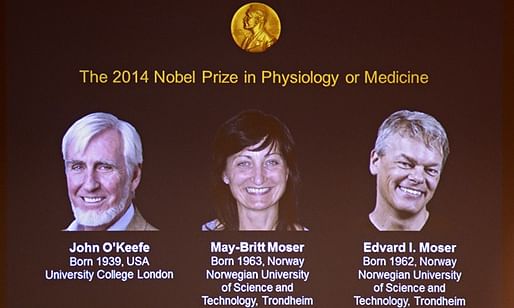

The three scientists’ discoveries “have solved a problem that has occupied philosophers and scientists for centuries — how does the brain create a map of the space surrounding us and how can we navigate our way through a complex environment?” said the Karolinska Institute in Sweden, which chooses the laureates.
The positioning system they discovered helps us know where we are, find our way from place to place and store the information for the next time
— nytimes.com
Back in 1971, John O'Keefe identified "place cells" in the brain – neurons that were selectively activated in relation to the subject's place in an environment. He concluded these nerves were composing a mental map of the space, and the collection of multiple place cells constituted a spatial memory of the environment.
Then in 2005, May-Britt Moser and Edvard I. Moser identified another group of nerve cells, the so-called "grid cells", that create a coordinate system in the brain. Together, place cells and grid cells create a precise understanding of space in the brain, allowing for navigation and spatial memory.
1 Comment
OK first of all this story made me tear up: ...he landed and turned on his cellphone, to a barrage of messages and calls. “I didn’t know anything,” the A.P. quoted him as saying. “When I got off the plane there was a representative there with a bouquet of flowers who said, ‘Congratulations on the prize.’ ”
But turning away from emotions and towards science: the graphics accompanying the story show the rat's grid cells firing at points on, yes, a grid. Some people have said that nature doesn't have straight lines and this is an argument for curving spaces and walls, for more "organic" forms in architecture. Personally, I find grids soothing and comfortable. Could this be because my grid cells are more effective than the grid cells of someone who prefers curves? I've always had a good sense of direction and can use maps easily. A grid is, it seems, "natural", maybe more-so for some than others, but I'm reminded of Charles Mudede yet again:
The city is totally human. The steps in an apartment building are for human feet, the door knobs afford human hands, the bed is for a human back (a horse would crush a mattress, abhor a toilet bowl), the window is there for you, the streets are paved for your modes of transportation. This urban world didn't fall on you; it sprang from you. The woods are alienating. The river hates you.
Block this user
Are you sure you want to block this user and hide all related comments throughout the site?
Archinect
This is your first comment on Archinect. Your comment will be visible once approved.